初一英语一般现在时讲解及练习
初中英语语法一般现在时专项讲解及总结练习

初中英语语法一般现在时专项讲解及总结练习初中英语时态专题解说一般此刻时一、出现以下状况是用一般此刻时:常常性、习惯性的动作或存在的状态。
时间标记词:often常常,usually往常,always老是,every每个,sometimes有时,at在几点钟e.g.Igotoschoolonfoot.Heisverybusynow.Ioftendomyhomeworkat7:00.HeusuallygoestotheparkonSundaymorning.表示主语的特点、性格、能力、喜好等。
e.g.Hecanswim. Iworkhard. IlikewatchingTV.表示客观真谛e.g.Therearesevendaysinaweek.Themoonmovesroundtheearth.二、一般此刻时的句式变化:1)表示动作,一般人称作主语的,变否认句须在动词前加助动词don’t;变一般疑问句须在句首加助动词do。
E.g.一定句Theyhavelunchat12:00.否认句Theydon’thavelunchat12:00.疑问句Dotheyhavelunchat12:00? 一定回答:Yes,theydo.否认回答:No,theydon’t.2)单三人称做主语的,变否认句须在动词前加助动词doesn’t;变一般疑问句须在句首加助动词does。
e.g.一定句:Hegoestoschoolbybike. 否认句:Hedoesn’tgotoschoolbybike.疑问句:Doeshegotoschoolbybike? 一定回答:Yes,hedoes.否认回答:No,hedoesn’t1.She______(go)toschoolatseveno ’clock.否认句:一般疑问句:2.Theyusually_____upat17:00.(get)否认句:一般疑问句:3.Amy____(be)herejustnow.否认句:一般疑问句:实质演练1.Ihavemanybooks. (改为否认句)doeshishomeworkathome.否认句:一般疑问句:usuallywaterstheflowers.1初中英语时态专题解说否认句:一般疑问句YangusuallywashessomeclothesonSaturday. 否认句:5.IusuallyplayfootballonFridayafternoon. 否认句:一般疑问句:加强训练一、写出以下单词的第三人称单数形式1.work______ ____read__________clean__________write__________2.teach_____ _____wash__________guess__________watch__________3.go________ __do_________ __4.study_____ _____fly__________cry__________play__________5.have__________二.选择)1._____youhaveaboo k?A.DoB.AreC.Is D.Have)2.They_________onafarm .workingB.isworkC.working D.isworked)3.DoesPeterliketowatchTV?__________.A.Yes,helike B.No,hedoesn’tC.Yes,he’dlike D.No,helikes)4.Shedo esn’t__________herhomeworkintheafter noon.A.doingB.todoC.doesD.d o)5.How____________Mr.Brown___________toAmerica?A.do,goB.is,goC.does,go )6.Where’smy camera?I____________it.A.amnotfinding B.amnotseeing C.can’tfindD.can’tl ookat)7.How___________hegotowork?He___________toworkbybike.A.does;g oB.do;goesC.do;go D.does;goes)8.______youusuallylateforschool?No,_____ ________.A.Do;IamB.Does;notC.Are;I’mnotD.Are;Iaren’t)9._____she_____homeatsixeveryday?A.Is,leave B.Does,leave C.Is,leavesD.Does,le ft)10.Mr.Yang____________Englishthisterm .A.teachesour B.teachesus C.teachsusD.teachou r三.用所给动词的适合形式填空。
(完整版)一般现在时和特殊疑问句讲解及练习
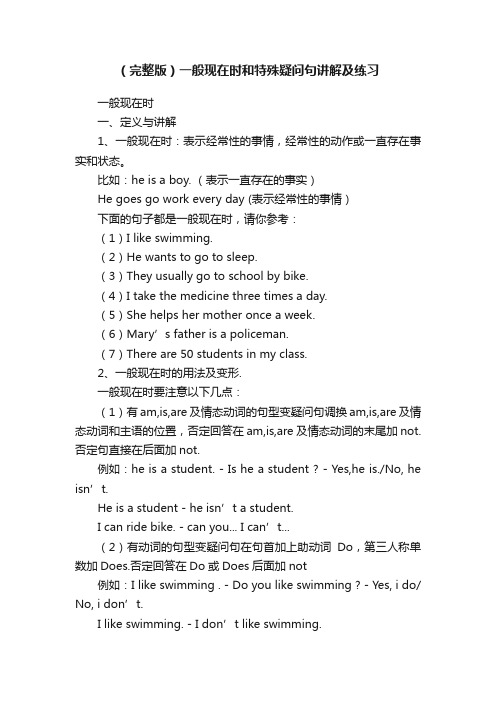
(完整版)一般现在时和特殊疑问句讲解及练习一般现在时一、定义与讲解1、一般现在时:表示经常性的事情,经常性的动作或一直存在事实和状态。
比如:he is a boy. (表示一直存在的事实)He goes go work every day (表示经常性的事情)下面的句子都是一般现在时,请你参考:(1)I like swimming.(2)He wants to go to sleep.(3)They usually go to school by bike.(4)I take the medicine three times a day.(5)She helps her mother once a week.(6)Mary’s father is a policeman.(7)There are 50 students in my class.2、一般现在时的用法及变形.一般现在时要注意以下几点:(1)有am,is,are及情态动词的句型变疑问句调换am,is,are及情态动词和主语的位置,否定回答在am,is,are及情态动词的末尾加not.否定句直接在后面加not.例如:he is a student. - Is he a student ? - Yes,he is./No, he isn’t.He is a student - he isn’t a student.I can ride bike. - can you... I can’t...(2)有动词的句型变疑问句在句首加上助动词Do,第三人称单数加Does.否定回答在Do或Does后面加not例如:I like swimming . - Do you like swimming ? - Yes, i do/ No, i don’t.I like swimming. - I don’t like swimming.(3)第三人称单数在动词的末尾要加s或es,以s,ch,sh结尾的单词加es,特殊单词特殊记.例如:He goes to school at 7:00 every day.要特别注意在什么情况要使用一般现在时.现在请你完成一些练习,让你更熟练地掌握一般现在时:(一).用动词的适当形式填空1. She _________(go) to school at seven o’clock.3. He usually ___________ up at 17:00.(get )4. She ___________ (live) in Beijing.7. My father __________ (watch) TV every evening .9.________ Amy _________ (read) English every day10. Chen Jie sometimes _________(go)to the park with her sister.(二).选择填空1.I want____homework now.A. doingB. to doC. to do myD. do my2.It's time______.A. go to schoolB. play gamesC. to go homeD. to do my homeworks3.______go and help her.A. Let's meB. Let's usC. Let'sD. Let's to4.Do they have a new car? Yes,_____.A .they are B.they have C. they don't D. they do5.He often _________ supper at 6:00 in the evening.A. haveB. has c. is having D. is eating6. We _____________ any Chinese classes on Friday.A. are havingB. aren’t havingC. don’t haveD. are have(三)、用括号内动词的适当形式填空。
英语一般现在时解题技巧及练习题(含答案)及解析
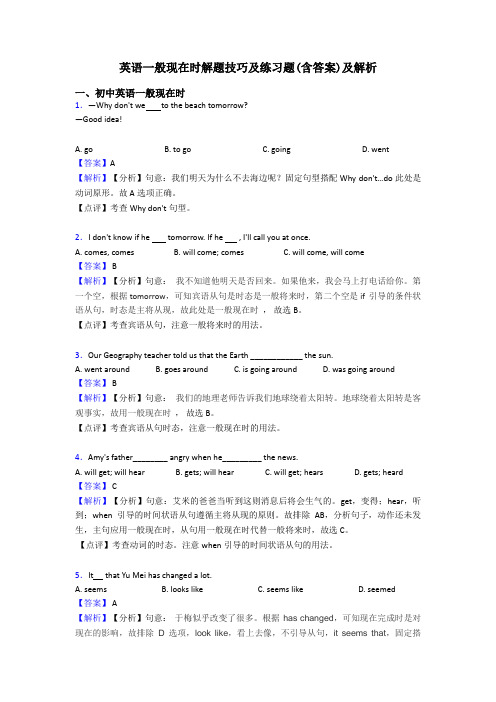
英语一般现在时解题技巧及练习题(含答案)及解析一、初中英语一般现在时1.—Why don't we to the beach tomorrow?—Good idea!A. goB. to goC. goingD. went【答案】A【解析】【分析】句意:我们明天为什么不去海边呢?固定句型搭配Why don't…do此处是动词原形。
故A选项正确。
【点评】考查Why don't句型。
2.I don't know if he tomorrow. If he , I'll call you at once.A. comes, comesB. will come; comesC. will come, will come【答案】 B【解析】【分析】句意:我不知道他明天是否回来。
如果他来,我会马上打电话给你。
第一个空,根据tomorrow,可知宾语从句是时态是一般将来时,第二个空是if 引导的条件状语从句,时态是主将从现,故此处是一般现在时,故选B。
【点评】考查宾语从句,注意一般将来时的用法。
3.Our Geography teacher told us that the Earth ____________ the sun.A. went aroundB. goes aroundC. is going aroundD. was going around【答案】 B【解析】【分析】句意:我们的地理老师告诉我们地球绕着太阳转。
地球绕着太阳转是客观事实,故用一般现在时,故选B。
【点评】考查宾语从句时态,注意一般现在时的用法。
4.Amy's father________ angry when he_________ the news.A. will get; will hearB. gets; will hearC. will get; hearsD. gets; heard 【答案】 C【解析】【分析】句意:艾米的爸爸当听到这则消息后将会生气的。
初中英语时态讲解及练习(全)

时间状语:Tomorrow, next day(week, month, year…),soon, in a few minutes, by…,the day after tomorrow, etc.
否定形式:主语+am/is/are not going to do ; 主语+will/shall not do+其他 一般疑问句:be放于句首;will/shall提到句首。
1.I ____(write, am writing, is writing, are writing) a letter now. 2.Look, it _____(begin, is beginning, am beginning, are beginning) to rain. 3.They ____(study, is studying, am studying, are studying) medicine at the Medical Institute of Chengde these days. 4.He _____(teach, am teaching, is teaching, are teaching) an English lesson at this time.
谓语动词使用过去式形式, 加ed,分为规则和不规则变 化。表示过去经常发生的动 作,也可用“used to do ” 和“would +动词原形”。
1. He____(be, was, were, been) here a moment ago. 2. They ____(be, was, were, been) here just now. 3. The scientists _____(leave, leaves, leaved, left) for America yesterday. 4. Last week we ______(visit, visited ) the Science Museum. 5. When I was a child, I often ____(play, played) football. 6. The students ran out of the classroom as soon as the bell ____(ring, rang, rung).
(完整)一般现在时讲解与练习(初中英语)
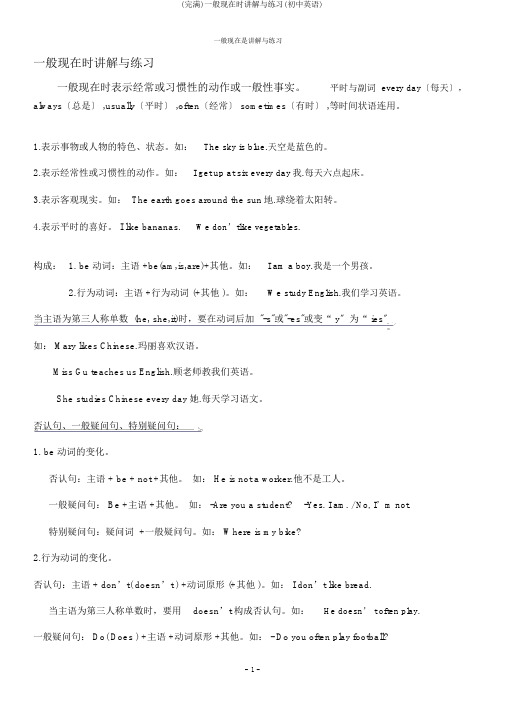
一般现在是讲解与练习一般现在时讲解与练习一般现在时表示经常或习惯性的动作或一般性事实。
平时与副词 every day〔每天〕,always〔总是〕 ,usually〔平时〕 ,often〔经常〕 sometimes〔有时〕 ,等时间状语连用。
1.表示事物或人物的特色、状态。
如:The sky is blue.天空是蓝色的。
2.表示经常性或习惯性的动作。
如:I get up at six every day我.每天六点起床。
3.表示客观现实。
如: The earth goes around the sun地.球绕着太阳转。
4.表示平时的喜好。
I like bananas.We don’tlike vegetables.构成: 1. be 动词:主语 +be(am,is,are)+其他。
如:I am a boy.我是一个男孩。
2.行为动词:主语 +行为动词 (+其他 )。
如:We study English.我们学习英语。
当主语为第三人称单数 (he, she,it)时,要在动词后加 "-s"或"-es"或变“ y〞为“ ies〞如: Mary likes Chinese.玛丽喜欢汉语。
Miss Gu teaches us English.顾老师教我们英语。
She studies Chinese every day她.每天学习语文。
否认句、一般疑问句、特别疑问句:1. be 动词的变化。
否认句:主语 + be + not +其他。
如: He is not a worker.他不是工人。
一般疑问句: Be +主语 +其他。
如: -Are you a student?-Yes. I am. / No, I’m not.特别疑问句:疑问词 +一般疑问句。
如: Where is my bike?2.行为动词的变化。
否认句:主语 + don’t( doesn’t ) +动词原形 (+其他 )。
初中语法重点:一般现在时的用法和练习详解附解析
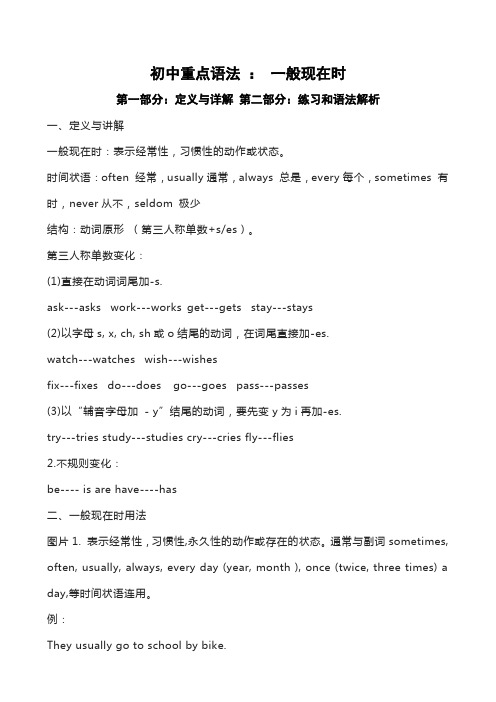
初中重点语法:一般现在时第一部分:定义与详解第二部分:练习和语法解析一、定义与讲解一般现在时:表示经常性,习惯性的动作或状态。
时间状语:often 经常,usually通常,always 总是,every每个,sometimes 有时,never从不,seldom 极少结构:动词原形(第三人称单数+s/es)。
第三人称单数变化:(1)直接在动词词尾加-s.ask---asks work---works get---gets stay---stays(2)以字母s, x, ch, sh或o结尾的动词,在词尾直接加-es.watch---watches wish---wishesfix---fixes do---does go---goes pass---passes(3)以“辅音字母加- y”结尾的动词,要先变y为i再加-es.try---tries study---studies cry---cries fly---flies2.不规则变化:be---- is are have----has二、一般现在时用法图片1. 表示经常性,习惯性,永久性的动作或存在的状态。
通常与副词sometimes, often, usually, always, every day (year, month ), once (twice, three times) a day,等时间状语连用。
例:They usually go to school by bike.I take the medicine three times a day.She helps her mother once a week.Mary’s father is a policeman.There are 50 students in my class.2. 表示客观真理,科学原理,自然现象,等客观事实或格言,谚语等。
例:The sun rises in the east and sets in the west every day.Tomorrow is Tuesday.三、一般现在时的句型转换(1)当句子中有be动词或情态动词时,则把be动词或情态动词(can,could等等)提到主语的前面变成疑问句;在be动词或情态动词后面加not变成否定句.例:①陈述句:She is a student.疑问句→Is she a student?否定句→She is not a student.②陈述句:I can swim.疑问句→Can you swim?否定句→I can not swim.(2) 当句子中即没有be动词,也没有情态动词时,则在主语前加助动词do (you,以及复数), does(单数she,he,it)变成问句;在主语后谓语动词前加助动词don’t(I,you,以及复数), doesn’t(单数she,he,it)变成否定句,助动词后的动词要变成动词原形。
(word完整版)初中英语七年级一般现在时、频度副词讲解及练习(2)

Unit 2 Daily life Grammar课堂练习一、一般现在时讲解及练习基本用法(1)一般现在时常表示经常发生的动作或经常存在的状态如: I go to school every day.表示此状态时,常和always, often, usually, everyday, sometimes等表示时间的状语连用,有时候时间状语可以不表示出来。
(2)表日常行为:如:The boy wake up at seven a'clock,wash ,dress quickly and run into the dining room for breakfast. They wait until they hear the bell and then go to school.(3)表习惯,能力等:如:Do you drive, Mike?(4)表客观存在:如:Fire burns火会燃烧(表客观事实)The earth moves round the sun.地球围绕太阳旋转(表客观真理)练习题:1. Tom is a worker. He _____ in a factory. His sisters _____ in a hospital.A. work/ workB. works/ workC. work/ works2. Who _____ English best in your class?A. speakB. speaksC. speaking3. Mrs. Read _____ the windows every day.A. is cleaningB. cleanC. cleans4. We _____ music and often _____ to music.A. like/ listenB. likes/ listensC. like/ are listening5. She _____ up at six in the morning. A. get B. gets C. getting6. On Sunday he sometimes _____ his clothes and sometimes _____ some shopping.A. wash/ doB. is washing/ is doingC. washes/ does7. The twins(双胞胎)usually _____ milk and bread for breakfast, but Jim _____ some coffee for it.A. have/ haveB. have/ hasC. has/ have8.Jenny ____ in an office. Her parents ____in a hospital.A work worksB works workC work are workingD is working work9. One of the boys_____ a black hat.A haveB there isC there areD has10. We will go shopping if it____ tomorrow.A don't rain Bdidn't rain Cdoesn't rain Disn't rain11. He said the sun ____in the east and ____in the west.A rose; setB rises; setsC rises, setD rise; sets12. Wang Mei ____ music and often ____ to music.A like; listenB likes; listensC like; are listeningD liking ; listen13. Jenny____ English every evening.A has studyB studiesC studyD studied14. She _____ up at six in the morning.A. getB. getsC. getting15.The students will go to the Summer Palace if it _____ tomorrow. A.don't rain B. doesn't rain C. won't rain16. The picture _______ nice.A. looksB.is lookedC. lookD.is looking17. Don't smoke until the plane ______ off.A. takes B .took C. was taken D.is take18. John is always ______ others.A. helpB. helpingC. helpsD. to help19. You'd better ______ at home and ______ your homework.A. to stay, doB. stay, doC. to stay, to doD. stay, to do20. Uncle Wang knows _______ a washing machine.A. how to makeB. to makeC. how makingD. what to make21. My father always __________(come) back from work very late.22. The teacher is busy. He __________ (sleep) six hours a day.23. Listen! Joan __________(sing) in the classroom. She often __________ (sing) there.24. __________ your brother __________(know) Japanese?25. Where __________ you __________ (have) lunch every day?26. The girl __________(like) wearing a skirt. Look! She __________(wear) a red skirt today.二、频度副词、短语用法及练习一般现在时常常与always, usually, often, sometimes, seldom, hardly, never等频度副词连用,表示动作发生的频率。
(完整)初一英语一般现在时讲解及练习
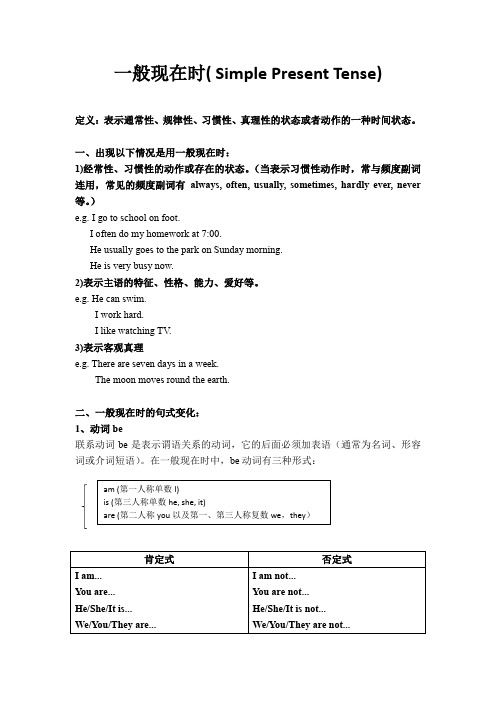
一般现在时( Simple Present Tense)定义:表示通常性、规律性、习惯性、真理性的状态或者动作的一种时间状态。
一、出现以下情况是用一般现在时:1)经常性、习惯性的动作或存在的状态。
(当表示习惯性动作时,常与频度副词连用,常见的频度副词有 always, often, usually, sometimes, hardly ever, never 等。
)e.g. I go to school on foot. I often do my homework at 7:00.He usually goes to the park on Sunday morning. He is very busy now.2)表示主语的特征、性格、能力、爱好等。
e.g. He can swim.I work hard. I like watching TV . 3)表示客观真理e.g. There are seven days in a week.The moon moves round the earth.二、一般现在时的句式变化: 1、动词be联系动词be 是表示谓语关系的动词,它的后面必须加表语(通常为名词、形容词或介词短语)。
在一般现在时中,be 动词有三种形式:一、用be的适当形式填空1.---How____ you? ---I____ fine.2.I___ David,and my family name___ Green.3.---What color ___ your clock? ---It___ white.4.---What___ this in English?---It___ an apple.5.Toy___my brother.David____my brother,too.They ___ my brothers.6.Look!These____apple trees.7.We____ good students and you____ good teacher.8.My sister and my brother_____ students.9. _____there many eggs in the kitchen?10.____your card number 5578?11.Where_____ your pencils?12.These sweaters ______ fifty dollars.13.How much ____ his jacket?14.My brother’s birthday____ December 11th.15.When _____ Kate’s birthday?16、There_____a boy and two girls beside the gate.17、Five and three ____ eight.二、.将下面的句子变成一般疑问句。
- 1、下载文档前请自行甄别文档内容的完整性,平台不提供额外的编辑、内容补充、找答案等附加服务。
- 2、"仅部分预览"的文档,不可在线预览部分如存在完整性等问题,可反馈申请退款(可完整预览的文档不适用该条件!)。
- 3、如文档侵犯您的权益,请联系客服反馈,我们会尽快为您处理(人工客服工作时间:9:00-18:30)。
一般现在时( Simple Present Tense) 定义:表示通常性、规律性、习惯性、真理性的状态或者动作的一种时间状态。
一、出现以下情况是用一般现在时:1)经常性、习惯性的动作或存在的状态。
(当表示习惯性动作时,常与频度副词连用,常见的频度副词有always, often, usually, sometimes, hardly ever, never 等。
)e.g. I go to school on foot.I often do my homework at 7:00.He usually goes to the park on Sunday morning.He is very busy now.2)表示主语的特征、性格、能力、爱好等。
e.g. He can swim.I work hard.I like watching TV.3)表示客观真理e.g. There are seven days in a week.The moon moves round the earth.二、一般现在时的句式变化:1、动词be联系动词be是表示谓语关系的动词,它的后面必须加表语(通常为名词、形容词或介词短语)。
在一般现在时中,be动词有三种形式:一、用be的适当形式填空1.---How____ you? ---I____ fine.2.I___ David,and my family name___ Green.3.---What color ___ your clock? ---It___ white.4.---What___ this in English?---It___ an apple.5.Toy___my brother.David____my brother,too.They ___ my brothers.6.Look!These____apple trees.7.We____ good students and you____ good teacher.8.My sister and my brother_____ students.9. _____there many eggs in the kitchen?10.____your card number 5578?11.Where_____ your pencils?12.These sweaters ______ fifty dollars.13.How much ____ his jacket?14.My brother’s birthday____ December 11th.15.When _____ Kate’s birthday?16、There_____a boy and two girls beside the gate.17、Five and three ____ eight.二、.将下面的句子变成一般疑问句。
1. That is my football.2. Those are his books.3. Jim and Tom are good friends.4. My birthday is November 1st.5. His son is twelve years old.三、将下面的句子变成否定句1. His card is on the table.2. These are my parents.3. Bob and Tony are our friends.4. These things are five dollars.5. The girl is his sister.四、划线提问1. Our teachers are in the classroom.2. The girl’s telephone number is 032-55746.3. Her pen is black.4. September 10th is Teachers′Day.5. They are thirteen years old.6. The boy is fine.7. The old man is my grandfather.8. These eggs are five yuan.2、实义动词do.1)表示动作,一般人称作主语的,变否定句须在动词前加助动词don’t;变一般疑问句须在句首加助动词do。
E.g.肯定句They have lunch at 12:00.否定句They don’t have lunch at 12:00.疑问句Do they have lunch at 12:00?2)单三人称做主语的,变否定句须在动词前加助动词doesn’t;变一般疑问句须在句首加助动词does。
e.g. 肯定句:He goes to school by bike.否定句:He doesn’t go to school by bike.疑问句:Does he go to school by bike?实际操练1. I have many books. (改为否定句)2.Tom does his homework at home.否定句:一般疑问句:3.Mingming usually waters the flowers.否定句:一般疑问句4.Su Yang usually washes some clothes on Saturday.否定句:5. I usually play football on Friday afternoon.否定句:一般疑问句:强化训练一、写出下列单词的第三人称单数形式1. work__________ read__________ clean__________ write__________2. teach__________ wash__________ guess__________ watch__________3. go__________ do___________4. study__________ fly__________ cry__________ play__________5. have__________二.选择( ) 1. _____ you have a book?A. DoB. AreC. IsD. Have()2. They _________ on a farm.A.are workingB. is workC. workingD. is worked() 3. Does Peter like to watch TV?__________.A. Yes, he likeB. No, he doesn’tC. Yes, he’d likeD. No, he likes( )4. She doesn’t __________ her homework in the afternoon.A. doingB. to doC. doesD. do( )5. How ____________ Mr. Brown ___________ to America?A. do, goB. is, goC. does, go()6. Where’s my camera? I____________ it.A. am not findingB. am not seeingC. can’t findD. can’t look at()7. How ___________ he go to work? He ___________ to work by bike.A. does; goB. do; goesC. do ; goD. does; goes ( )8. ______ you usually late for school? No, _____________.A. Do; I amB. Does ;notC. Are ; I’m notD. Are ; I aren’t()9. _____ she _____ home at six every day?A. Is , leaveB. Does , leaveC. Is , leavesD. Does , left( )10. Mr. Yang ____________ English this term.A. teaches ourB. teaches usC. teachs usD. teach our三.用所给动词的适当形式填空。
1. My classmate ______ (know) the man on the bike.2. His sister usually ______ (go) to school at 7:00 am.3. Lin Tao ______ (like) his new sweater.4. Let me ______ (have) a look.5. Let’s ______ (play) tennis!6. ______ he ______ (like) English?7. I want ______ (go) to a movie.8. He ______ (not know) the teacher’s name.9. Nice ______ (meet) you!10. Can I ______ (ask) the policeman?11. ______ (sit) down and ______ (have) a cup of tea.12. ______ (not look) at your book!13. ______ you ______ (can see) the bananas on the table?14. I need ______ (buy ) some new clothes.15. She likes ______ (play) chess.16. It’s time ______ (play) games.17. You must v (be) a good student.18. She must ______ (sing) well.19. He ______ (have) an egg and a banana for breakfast.20. Li Min ______ (take) a shower after lunch.21. People usually ______ (eat) dinner in the evening.22. What time ______ Mary usually ______ (play) basketball ?23. This boy likes ______ (play) chess with his father on weekends .24. Where ______ his parents ______ (work) now, do you know?25. Who ______ (teach) you English in your school?26. Helen, ______ (not be) late for class again.27. I don’t like the movie. It’s ______ (born).28. ______ (not look) at the pictures. ______ (listen) to me.29. Little Tom can ______ (ride) a horse.30. The weather ______ (be ) windy to day.四、改句子1.Do you often play football after school? (肯定回答)2. He doesn’t have any paper.(改为肯定句)3.Gao Shan's sister likes playing table tennis (改为否定句)4.She lives in a small town near New York. (改为一般疑问句)5.I watch TV every day. (改为一般疑问句)6 We have four lessons.(否定句)7. Nancy doesn't run fast (肯定句)8. .Mike has two letters for him. (一般疑问句)。
